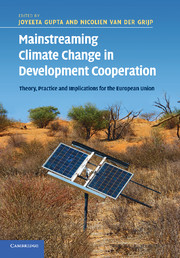 Mainstreaming Climate Change in Development Cooperation
Mainstreaming Climate Change in Development Cooperation Book contents
- Frontmatter
- Contents
- List of contributors
- Foreword
- Acknowledgements
- List of abbreviations
- Part I Introduction
- Part II Theoretical Exploration
- 2 Development and development cooperation theory
- 3 Mainstreaming climate change: a theoretical exploration
- Part III Governance
- Part IV Case Studies
- Part V Conclusions
- Index
- References
3 - Mainstreaming climate change: a theoretical exploration
Published online by Cambridge University Press: 07 May 2010
- Frontmatter
- Contents
- List of contributors
- Foreword
- Acknowledgements
- List of abbreviations
- Part I Introduction
- Part II Theoretical Exploration
- 2 Development and development cooperation theory
- 3 Mainstreaming climate change: a theoretical exploration
- Part III Governance
- Part IV Case Studies
- Part V Conclusions
- Index
- References
Summary
Introduction
There is increasing pressure in the policy world to mainstream climate change into development and development cooperation (see Section 1.6). Mainstreaming is a concept that brings marginal, sectoral, issues into the centre of discussions, thereby attracting more political attention, economic resources and intellectual capacities. The term ‘mainstreaming’ is often used loosely in climate discussions to mean a range of ideas that are referred to here as ‘incorporation’. It is also often used interchangeably with integration. However, this chapter argues that it is preferable to give a more specific meaning to the concept of mainstreaming and to make a clear distinction between mainstreaming and integration.
This chapter discusses the policy evolution of, and the driving factors behind, mainstreaming discussions to set the stage for the theoretical analysis (see Section 3.2). It examines what mainstreaming climate change means for development and development cooperation (see Section 3.3). It operationalizes the different elements of such processes (see Section 3.4) before drawing conclusions (see Section 3.5).
This chapter argues, first, that the policy attention to mainstreaming climate change into development and development cooperation arises out of the diverse motivations of the various actors. Second, the current discussions on climate-change mainstreaming follow mainstreaming discussions in other fields (e.g. gender) and its proponents should learn from and link up, where relevant, with them. Third, mainstreaming is the last step in the stages of incorporating climate change into policy processes.
- Type
- Chapter
- Information
- Mainstreaming Climate Change in Development CooperationTheory, Practice and Implications for the European Union, pp. 67 - 96Publisher: Cambridge University PressPrint publication year: 2010
References
- 9
- Cited by


